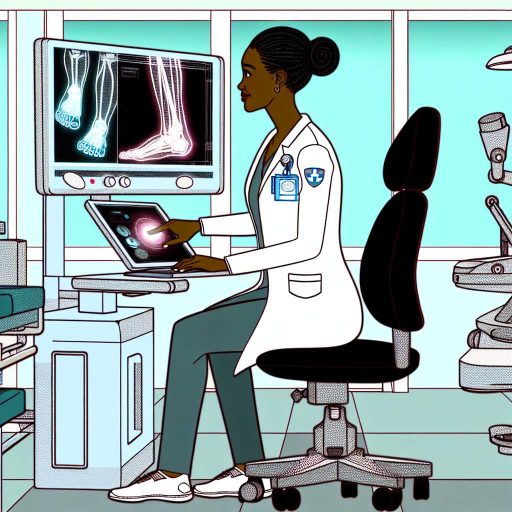Overview of Dental Specialties in Canada
Canada offers a diverse range of dental specialties.
Each specialty addresses unique aspects of oral health care.
Understanding these specialties can aid career choices for dental professionals.
Types of Dental Specialties
Dental specialties in Canada are recognized by the Royal College of Dentists.
Some recognized specialties include:
- Orthodontics
- Periodontics
- Prosthodontics
- Pediatric Dentistry
- Oral Surgery
- Endodontics
- Oral Pathology
Education and Training Requirements
Becoming a specialist requires advanced education and training.
Most Canadian dental specialties require additional two to four years of residency training.
Specialists must complete a postgraduate program specific to their field.
Certification by the relevant specialty board is essential.
Work Environment and Responsibilities
Dental specialists often work in various settings.
Common environments include private practices and hospitals.
They perform procedures that require advanced skills and knowledge.
Collaborating with general dentists is a significant part of their role.
Additionally, specialists participate in patient education and preventive care.
Career Outlook in Canada
The demand for dental specialists in Canada continues to grow.
Population health trends drive this increasing need.
Specialists may find numerous job opportunities across the country.
Furthermore, advancements in dental technology and techniques contribute to growth.
Financial Rewards
Dental specialists typically enjoy higher salaries than general dentists.
Factors affecting income include specialty type and geographical location.
Moreover, specialists can benefit from private practice ownership.
As a result, pursuing a specialty can be financially rewarding.
Educational Requirements for Dental Specialists
Overview of Dental Specialties
Dental specialists provide advanced care and treatment in specific fields.
These fields can include orthodontics, oral and maxillofacial surgery, and more.
Each specialty requires specific educational paths and training programs.
Unlock Your Career Potential
Visualize a clear path to success with our tailored Career Consulting service. Personalized insights in just 1-3 days.
Get StartedUndergraduate Education
A strong foundation starts with a bachelor’s degree in a relevant field.
Most dental schools require courses in biology, chemistry, and physics.
Some students may choose to pursue a degree in dental hygiene or a related area.
Dental Admission Test
Students must pass the Dental Admission Test (DAT) to apply for dental school.
This standardized test assesses general academic ability and scientific knowledge.
Preparing well can significantly impact acceptance into desired programs.
Dentistry Program Requirements
Dental specialists must graduate from an accredited dental school.
Typical programs last four years and culminate in a Doctor of Dental Surgery (DDS) or Doctor of Dental Medicine (DMD) degree.
During these years, students receive a comprehensive education in dental sciences.
Residency Training
After dental school, aspiring specialists enter residency programs.
Residency lengths vary by specialty, typically lasting two to six years.
These programs provide hands-on experience and specialized training.
Students gain critical skills under the supervision of experienced professionals.
Licensing and Certification
To practice as a dental specialist, licensure is mandatory.
Dental professionals must pass both national and provincial exams.
Certification from the Royal College of Dentists of Canada may also be required.
Continuous Education and Professional Development
Dentistry is an evolving field requiring ongoing education.
Specialists should engage in continued professional development courses.
This education helps them stay updated on new technologies and techniques.
Networking within dental associations can provide valuable resources.
Common Dental Specialties: Roles and Responsibilities
Orthodontics
Orthodontists specialize in aligning teeth and jaws.
Their primary goal is to improve patients’ smiles and oral health.
They use braces, retainers, and other appliances to achieve optimal alignment.
Additionally, orthodontists often collaborate with general dentists for overall care.
Pediatric Dentistry
Pediatric dentists focus on the dental needs of children.
They create a comfortable environment for young patients.
From infancy to adolescence, they monitor oral development.
Furthermore, they educate parents on maintaining good dental habits.
Periodontics
Periodontists specialize in the treatment of gum disease.
They perform procedures to save teeth affected by periodontal issues.
Additionally, they place dental implants to replace missing teeth.
Regular check-ups and cleaning are crucial for periodontal health.
Oral and Maxillofacial Surgery
This specialty involves surgical treatment of the mouth and face.
Surgeons perform extractions, reconstructive surgery, and more.
They manage complex cases, such as facial trauma and jaw disorders.
Additionally, they work closely with other specialties for comprehensive care.
Endodontics
Endodontists focus on the interior of teeth and root canals.
Their primary role is to diagnose and treat dental pain.
They perform root canal treatments to save infected teeth.
Additionally, they provide necessary follow-up care, ensuring healing.
Prosthodontics
Prosthodontists restore and replace missing teeth.
They create dentures, bridges, and crowns tailored to each patient.
These specialists often work with patients seeking cosmetic enhancements.
Moreover, they emphasize functionality alongside aesthetics in dental work.
Explore Further: Kinesiologists’ Role in Enhancing Athletic Performance
Licensing and Certification Process for Dentists in Canada
Overview of the Process
The licensing process for dentists in Canada involves several key steps.
Initially, candidates must complete a dental education program.
Next, they must pass the National Dental Examining Board (NDEB) examinations.
This process ensures that prospective dentists meet the required standards.
Educational Requirements
To begin, candidates need a dental degree from an accredited institution.
Most dental programs in Canada last four years.
Additionally, pre-dental education is typically required.
Candidates often complete a Bachelor of Science degree prior to dental school.
Exam Structure
The NDEB examinations consist of multiple components.
Firstly, candidates take a written exam, which assesses theoretical knowledge.
Subsequently, they complete an Objective Structured Clinical Examination (OSCE).
This practical examination evaluates clinical skills and competencies.
Certification and Registration
Upon passing the NDEB exams, dentists can apply for certification.
Each province or territory has its regulatory body for dentists.
Candidates must register with their respective regulatory body.
This registration allows them to practice legally in that region.
Continuing Education and Professional Development
Once licensed, dentists are required to pursue continuing education.
This ongoing education helps maintain skills and knowledge.
Many provinces mandate specific hours of continuing education annually.
Furthermore, participation in workshops and conferences is encouraged.
You Might Also Like: How Chiropractors Treat Common Sports Injuries
Job Market and Demand for Dental Specialists in Canada
Current State of the Job Market
The job market for dental specialists in Canada remains robust and growing.
Many factors contribute to this growth, including an aging population and increased awareness of oral health.
According to recent statistics, dental job openings are expected to rise significantly in the coming years.
This trend creates various opportunities for dental professionals across the country.
Types of Dental Specialties
Canada offers several dental specialties, each with unique career paths.
Common specialties include orthodontics, periodontics, and oral surgery.
Orthodontists focus on correcting teeth and jaw alignment, improving patients’ smiles.
Periodontists specialize in gum disease treatment and dental implants.
Oral surgeons handle more complex surgical procedures related to the mouth and jaws.
Each specialty demands advanced education and training for qualified practitioners.
Regional Demand for Dental Specialists
The demand for dental specialists often varies by region in Canada.
Urban areas tend to have higher concentrations of dental practices and specialists.
In contrast, rural regions may experience shortages and high demand.
Many dental specialists are drawn to these underserved areas for career growth opportunities.
Factors such as community health needs and local government incentives also play a role.
Growth of Dental Technology
New technologies are significantly shaping the dental landscape in Canada.
Innovations like digital imaging and laser dentistry enhance patient care and efficiency.
As technology advances, the need for specialists adept in these new methods rises.
Dental professionals must stay current with these trends to remain competitive.
Career Outlook for Dental Specialists
The career outlook for dental specialists in Canada remains promising.
Job stability and high earning potential attract many to this field.
Furthermore, dental specialists enjoy flexible work hours and varied practice settings.
As oral health awareness continues to grow, demand for specialists will likely increase.
Ultimately, pursuing a dental specialty can lead to a rewarding career with numerous opportunities.
Gain More Insights: Benefits Of Chiropractic Care For Overall Wellbeing

Salary Expectations for Various Dental Specialties
Overview of Dental Specialties
Dentistry offers a variety of specialties in Canada.
Each specialty focuses on different aspects of oral health.
Understanding their salaries is crucial for prospective dentists.
General Dentist Salary
General dentists are the backbone of dental care.
They typically earn between $120,000 and $200,000 annually.
Your earnings often depend on location and experience.
Urban areas tend to offer higher salaries.
Orthodontist Salary
Orthodontists specialize in aligning teeth and jaws.
Their average salary ranges from $200,000 to $350,000.
This specialty often requires additional years of education.
Therefore, orthodontists generally see a higher return on investment.
Pediatric Dentist Salary
Pediatric dentists focus on children’s dental health.
They usually earn between $160,000 and $250,000 per year.
Their work often requires a specialized skill set and patience.
Additionally, demand for pediatric dentists remains strong.
Oral Surgeon Salary
Oral surgeons perform complex surgical procedures.
Their earnings range from $250,000 to $500,000 annually.
This profession demands extensive training and expertise.
As a result, they are one of the highest-paid dental specialists.
Endodontist Salary
Endodontists specialize in root canals and related treatments.
They typically earn between $150,000 and $300,000 per year.
This specialty requires specialized training beyond dental school.
Their expertise is essential for saving damaged teeth.
Periodontist Salary
Periodontists deal with gum health and diseases.
Their salary often falls between $170,000 and $300,000 annually.
They play a crucial role in maintaining overall oral health.
Moreover, periodontal disease treatments are increasing in demand.
Market Trends and Influencing Factors
Salaries in dental specialties are influenced by various factors.
Firstly, geographical location plays a significant role.
Urban centers often offer higher salaries compared to rural areas.
Additionally, experience and level of education affect earnings.
Furthermore, demand for specialized dental services continues to rise.
Implications for Career Planning
Understanding salary expectations is vital for career planning.
With the proper specialization, dentists can enjoy lucrative careers.
Continued education can enhance earning potential further.
As the dental field evolves, opportunities will expand.
Find Out More: Podiatry Services Covered by Canadian Healthcare
Continuing Education and Professional Development in Dentistry
The Importance of Lifelong Learning
Dental professionals should continually update their skills and knowledge.
This process enhances their ability to provide quality patient care.
Moreover, ongoing education helps them stay aware of industry advancements.
Continuing education can also lead to new career opportunities.
Types of Continuing Education Programs
Dentists can choose from various formats for continuing education.
Webinars are a popular option for those seeking flexibility.
Conferences and workshops offer hands-on experience and networking.
Online courses provide convenient learning for busy professionals.
Specialized Courses and Certifications
Many dental specialties require additional training and certification.
Oral surgery courses enhance surgical skills and techniques.
Pediatric dentistry programs focus on the unique needs of children.
Additionally, orthodontics training allows for advanced knowledge in dental alignment.
Professional Associations and Resources
Joining professional associations can benefit dental professionals significantly.
Organizations such as the Canadian Dental Association provide valuable resources.
These associations often offer access to seminars and workshops.
Networking opportunities with peers can lead to shared knowledge and collaboration.
Staying Current with Technological Advances
Technological advancements in dentistry are ever-evolving.
Continuing education programs often include training on new tools and techniques.
Staying informed helps practitioners maintain a competitive edge.
Furthermore, it ensures they provide the best care possible.
Career Pathways: From General Dentistry to Specialization
Understanding General Dentistry
General dentistry serves as the foundation of dental practice.
It encompasses a variety of services for patients of all ages.
Moreover, general dentists focus on preventive care.
They help maintain oral health through regular check-ups.
Additionally, they provide treatments for common dental issues.
After gaining experience, many dentists consider specialization.
Overview of Dental Specialties
Dentistry offers multiple specialties to pursue.
Common fields include orthodontics, oral surgery, and periodontics.
Specialists require additional education and training after dental school.
This advanced training deepens their expertise in specific areas.
Furthermore, specialists often enjoy unique career opportunities.
Pathway to Specialization
After completing dental school, dentists choose their pathway.
Many opt for a residency program in their chosen specialty.
Residencies provide hands-on experience and advanced education.
For instance, a pediatric dentist focuses on children’s oral health.
Similarly, an endodontist specializes in root canal treatments.
Career Opportunities and Demand
The demand for dental specialists continues to grow in Canada.
This trend reflects the increasing awareness of oral health.
Furthermore, specialists often earn higher salaries than general dentists.
Many opportunities exist in both public health and private practice.
Additionally, specialists can work in academia or research.
Support for Aspiring Specialists
Aspiring dental specialists can find support through various organizations.
Professional associations offer resources and networking opportunities.
Moreover, mentorship programs connect students with experienced professionals.
These resources can aid in navigating the specialization process.
Support enhances the journey toward specialization.
Additional Resources
US vs. Canadian Healthcare: What is The Difference? | RUSM




